Magento B2B Ecommerce: Key Features to Maximize Sales
Vinh Jacker | 08-29-2023
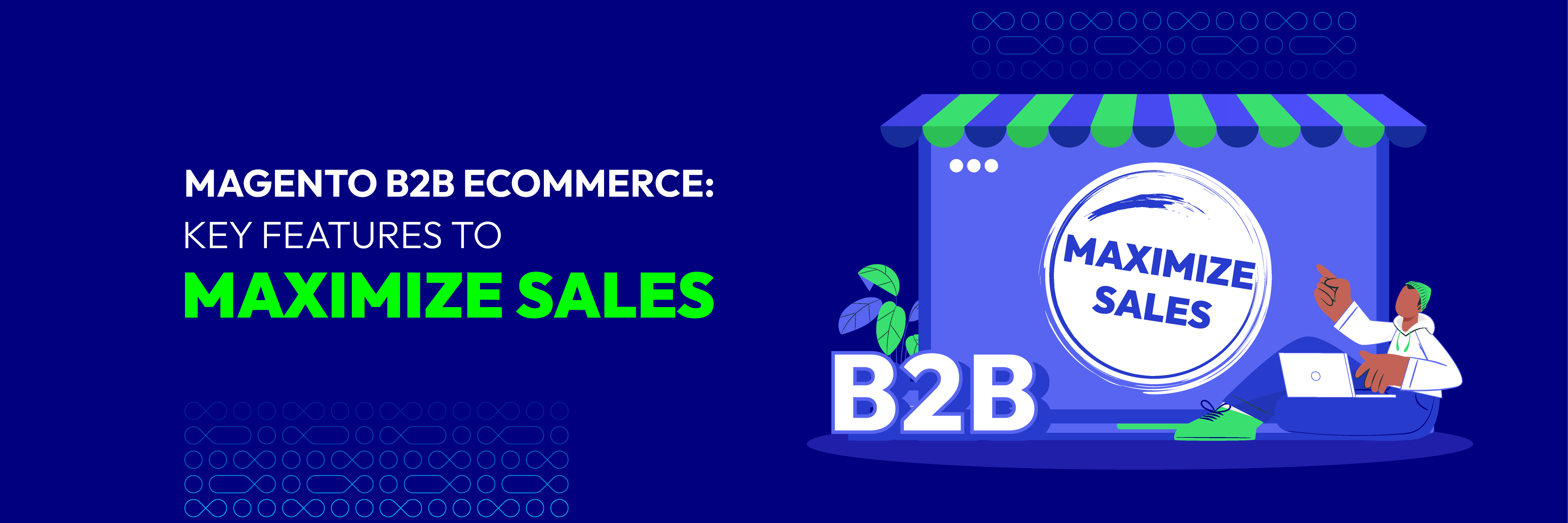
When it comes to Magento B2B commerce, businesses are adapting for smoother and user-friendly ecommerce. As industries shift online, a strong B2B platform is essential.
Magento is a renowned leader in B2B commerce, offering a comprehensive solution tailored to unique B2B needs. This article explores Magento’s benefits as a B2B ecommerce platform, discussing Magento 2’s robust B2B features and strategies for online success.
Among these pivotal components are quick ordering, inventory management, and credit limit management. Discover why Magento excels as the go-to B2B ecommerce platform.
Is Magento a Suitable Platform for B2B?

Businesses always seek modern B2B commerce solutions that offer simplicity, unity, efficiency, and choice to match their strategic goals of scaling, reaching international markets, and enhancing customer experiences.
The reason why researchers chose these features is because they help businesses do B2B commercial transactions that fit their goals. These goals may involve growing, expanding to other countries and more customers, and adding new features that make the processes easier and better for the customers. The issue is that not all eCommerce platforms can provide all of that.
-
While suitable for small companies, Shopify lacks the scalability and customization required for enterprises aiming for expansion, vendor diversification, or having a customized theme with added functions.
-
Salesforce B2B Commerce leads the industry but faces clients’ frequent complaints for storefront speed.
-
Commercetools excels in platform architecture but needs to improve business intelligence and workflow, hindering its effectiveness.
An all-in-one, out-of-the-box solution that meets the market needs with its features is Magento 2.
With Magento Commerce B2B features, Magento offers outstanding search functionality, personalized buying experiences, detailed reporting, and multi-channel selling capabilities. Its mobile responsiveness and seamless ordering process ensure a frictionless customer journey, while its extensive native B2B functionality meets diverse business needs.
Furthermore, Magento’s versatility extends to seamless integration with ERP, CRM, and other backend systems, providing businesses with enhanced flexibility and operational efficiency. Besides, its cloud infrastructure and theme customization options give the foundation for solutions suitable for diverse business models and market demands.
What Is Magento B2B?
Magento B2B is a platform that allows businesses to sell their products or services online to other businesses.
The Magento B2B module offers a comprehensive solution for B2B eCommerce . It enables businesses to handle their customers, inventory, orders, and shipping efficiently and securely online. It also has features such as custom catalogs and pricing, quote management, account management, and order placement that make it suitable for B2B transactions.
With Magento B2B features, businesses can optimize their online operations and provide a high-quality shopping experience to their customers.
Furthermore, Magento B2B is considered part of Adobe Commerce, which also supports B2C eCommerce. Magento B2B is used by many businesses worldwide, such as Carrier Enterprise, Grainger, and Nestle.
Magento B2B ecommerce Key Features
1. Comprehensive Platform for B2B Enterprises
Magento eCommerce system provides an all-inclusive answer for B2B enterprises, granting them the ability to swiftly oversee clients, diverse labels, distribution collaborators, and profiles.
With a simple configuration, Magento can be harmonized with your ERP or CRM systems, facilitating the streamlined monitoring of estimates, past orders, and credit control.
This unified platform guarantees a uniform brand encounter for both B2B and B2C patrons.
2. Advanced customer groups and segments
Magento B2B commerce provides the capability to establish customer clusters and divisions grounded in customer actions, encompassing actions like browsing patterns, buying records, or alternative factors.
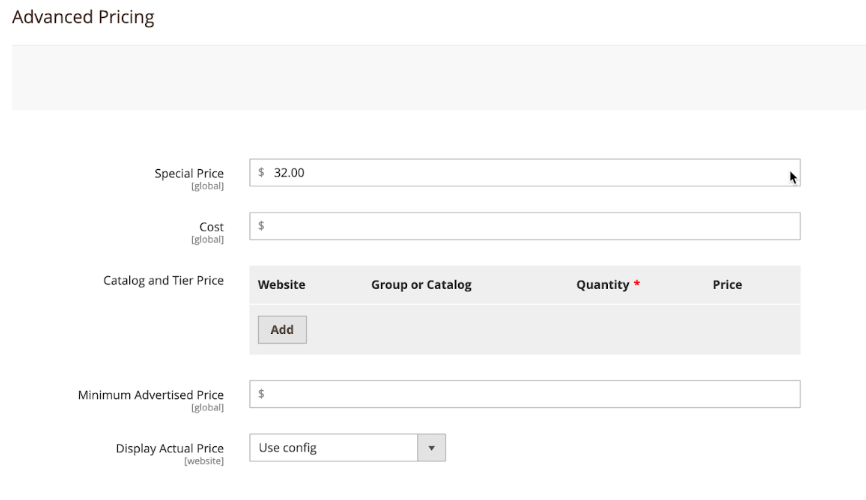
Source: Adobe Experience League
This feature empowers enterprises to customize their offerings for distinct sets of customers, resulting in heightened contentment and allegiance. It permits the presentation of content and promotional activities tailored to particular customers in alignment with specific attributes.
Magento facilitates the implementation of customer sections and groups by analyzing:
- Previous transaction history -Particular products observed
- Items presently residing in the shopping cart
- Cumulative value of the items
- Quantity of items within the cart
3. Quick Ordering and Requisition Lists
Magento’s swift ordering function empowers purchasers to swiftly and conveniently place orders, offering clients the option to input SKUs or directly utilize requisition lists.
By allowing customers to bypass extensive browsing and move straight to checkout, this feature expedites the purchasing process, aiding in the swift renewal of orders for recurring acquisitions and ultimately stimulating the increase in revenue.
The requisition lists permit vendors to craft limitless compilations of frequently requested items, encompassing top-selling products or the most recent assortments. These lists can be allocated by vendors to designated customers, providing an uncomplicated procedure for reordering.
Merchants can initiate Requisition Lists by selecting “Create New Requisition List,” conveniently located in their account’s sidebar, and proceed to append items to the list.
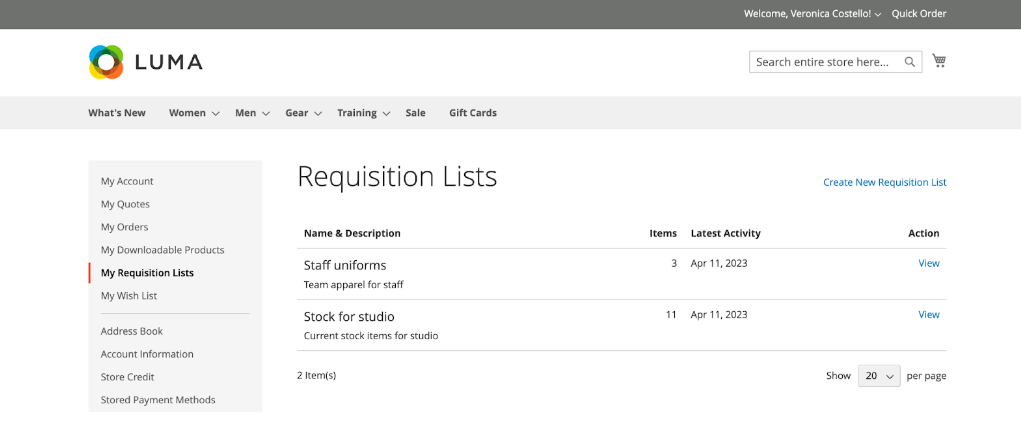
Source: Adobe Experience League
Magento automatically validates the SKU, cross-referencing it with inventory data and notifying the client about product availability.
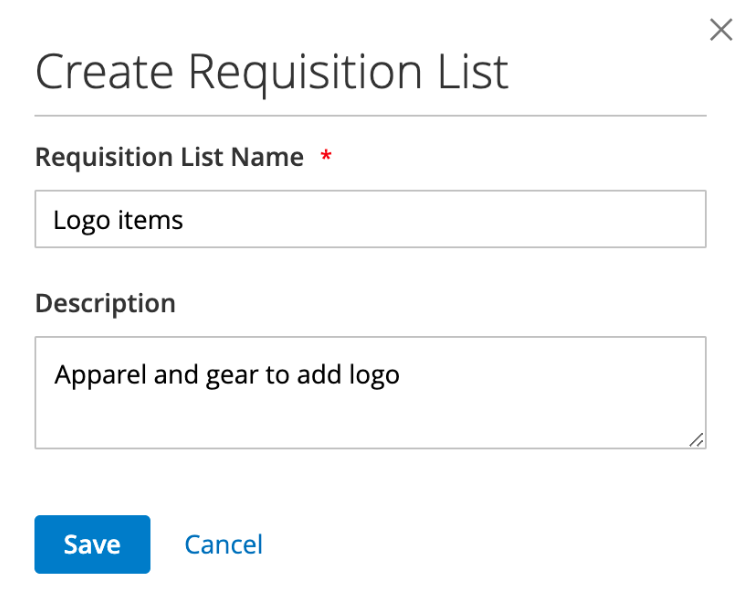
Source: Adobe Experience League
These robust B2B attributes within Magento contribute to operational streamlining and the cultivation of revenue expansion.
4. Advanced analytics
With Magento B2B commerce websites, specialized analytical solutions play a pivotal role in fostering business expansion. The objectives of each B2B customer are distinct, even when they are placing orders for identical items.
Cutting-edge analytics permit the customization of Key Performance Indicator (KPI) tracking for individual customers, drawing insights from catalogs, contracts, and interactions.
Magento’s Business Intelligence aids in the surveillance of your business analytics. Through Magento 2.4, access to more than 25 reports geared towards B2B operations is facilitated and presented through user-friendly dashboards.
This empowers a comprehensive exploration of customer insights, equipping you to make well-informed decisions that drive the growth of revenue.
You can leverage the following:
- Retention rates
- Average order value
- Customer lifetime value
- Customized catalogs and pricing for specific customers
- Precisely targeted content
- Recommendations for products
5. Managing Inventory
Magento’s intelligent inventory management function contributes to the enhancement of B2B activities by fine-tuning operations. It furnishes clientele with up-to-the-moment inventory information spanning the complete supply network.
The procedure of monitoring stock levels can be automated, a facet offered by Magento B2B through its replenishment regulations. This mechanism triggers the automatic reordering of items upon their levels dwindling.
Magento further enables the refinement of delivery expenses and timing, bringing about optimization. Distributors gain insights into the stock availability across diverse sites, ultimately leading to the augmentation of customer experiences and a surge in sales.
6. Flexible Credit Limits and Payment Options
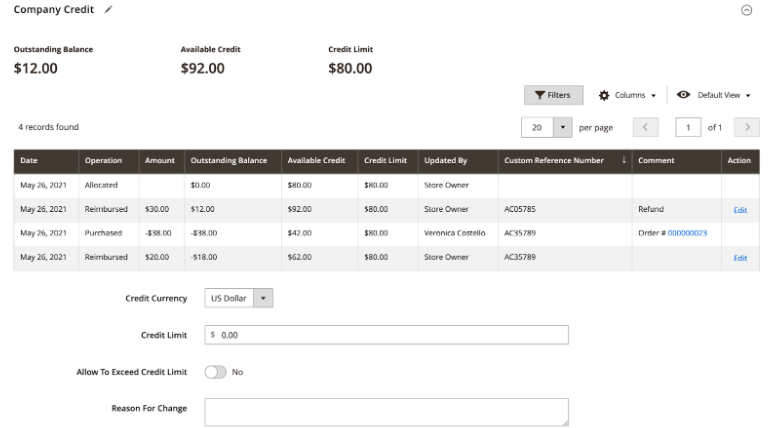
Source: Adobe Experience League
Magento recognizes the pivotal role of credit in B2B trade. The system empowers enterprises to retain modes of payment and records of procurement activities.
For trustworthy purchasers, credit limits can be assigned, providing them the flexibility to opt for a “payment on account” alternative during checkout, facilitating payment at their convenience.
For every business profile, you can configure the subsequent credit-related variables:
- Currency for credit transactions
- Maximum allowable credit limit
- Permission to surpass the stipulated credit limit
- Explanation for any modifications to the credit parameters.
Enterprise Resource Planning (ERP) or Customer Relationship Management (CRM) systems provide the capability to synchronize credit limits seamlessly across various platforms.
7. Company Credit Reimbursements
Magento also provides the option to establish a reimbursed amount for each account. Administrators can input the reimbursed sum within the company’s profile, a step taken after the company returns the funds.
Upon reimbursement, Magento recalibrates the remaining balance and logs this action in the credit history. To execute a payment adjustment for a company’s account, adhere to these steps:
- Navigate to Customers > Companies in the Magento Admin interface.
- Enter the editing mode for the respective company record.
- Click on Reimburse Balance located at the page’s upper section.
- Fill out the payment particulars, indicating the amount as either positive or negative.
- Input the Purchase Order number, or alternatively, generate separate reimbursements for multiple transactions.
- Click the Reimburse button to apply for the payment.
Magento streamlines the process of postponed payments and credit reimbursements for B2B enterprises.
8. Payment Deferral in Magento 2
When it comes to Magento B2B commerce transactions, deferred payments are anticipated for substantial orders and enduring partnerships.
Businesses can finalize their checkout process with deferred payments without requiring the installation of a Magento extension. This functionality allows for the monitoring of customer credit information and the establishment of limits for individual accounts. Reliable buyers are granted the privilege of accessing more extensive credit limits.
9. Quotes and Price Negotiation System in Magento

Source: Adobe Experience League
B2B transactions frequently involve sizable orders and recurrent bargaining.
Magento boasts an advanced quotation system, enabling purchasers to solicit quotes and partake in price discussions through a structured quote solicitation process. By catering to the distinct requisites of Magento B2B clients, this system garners a larger pool of buyers and amplifies the rate of converting sales.
Leveraging Magento’s B2B Quote attribute, eligible buyers can trigger negotiations regarding prices. These negotiations transpire prior to the procurement of items from the catalog.
The request form encompasses the complete correspondence history shared between the buyer and the seller. Furthermore, it offers the capability to annex supplementary files. The merits of Magento’s B2B Quote functionality encompass:
- Rapid price negotiations anchored in offers.
- Tracking of quote statuses and document uploads.
- Direct communication with sales representatives.
- Exclusive access for authorized users.
- The choice to specify expiration dates for quotes.
- The capacity to approve or decline quotes while computing discounts.
- Assessment of total expenses and possibilities for upselling.
Using Magento, enterprises can effectively oversee inquiries for quotations and engage in price discussions. This capability allows companies to establish themselves as reputable vendors known for their reliable practices.
Magento eCommerce: Improving the B2B Customer Experience
1. Adaptable Design for Mobile Devices
An adaptable and mobile-responsive online shopping platform is essential to deliver a distinct shopping journey.
Magento B2B commerce places emphasis on a design approach centered around mobile usage, presenting refined navigation and user-friendly interfaces. Additionally, it ensures swift page loading to ensure seamless user interactions across various devices.
By giving precedence to mobile-oriented users, Magento assists businesses in maintaining their competitiveness in the market.
2. Target merchandising through rule-based product relations
Magento’s feature for product relations guided by rules empowers enterprises to craft individualized product suggestions.
These suggestions are formulated upon established criteria, encompassing customer actions, past purchase records, or attributes native to Magento products. This capability grants companies the means to endorse pertinent products to their clientele.
In turn, this practice heightens the potential for fostering cross-selling and up-selling possibilities.
3. Content staging and dynamic product pages
Content staging comes as an inherent characteristic of Magento. This function facilitates the oversight and preview of content modifications before they go live, ensuring the steady and flawless portrayal of your offerings.
In the context of Magento, dynamic product pages showcase customized product details, shaped by customer categories or their browsing tendencies.
Moreover, this feature extends the capability to automate changes as per a predetermined timetable. This encompasses content staging for products, categories, and pricing rules. Notably, you can also schedule content staging for Magento CMS pages and widgets.
Magento B2B Technical Support
1. Proficient Support for Issue Resolution and Updates
Magento Commerce (also known as Magento Enterprise) provides specialized technical assistance for B2B vendors, encompassing:
- Problem resolution
- Site enhancements
- Accessibility to Magento B2B documentation
- Utilization of Magento Commerce Support Knowledge Base
- Generating support tickets for supplementary assistance
Magento’s support team aids B2B enterprises in resolving various challenges, ensuring the continuous, high-performance operation of their ecommerce endeavors.
2. Magento Security features
For any B2B ecommerce enterprise, safeguarding sensitive customer and transactional data is of paramount importance, making Magento’s security measures essential.
Magento acknowledges this critical concern and delivers robust security attributes, which encompass the following:
- Two-factor authentication (2FA)
- Strong encryption of data
- Regular application of security patches
- Adherence to Payment Card Industry (PCI) compliance standards
In the case of Magento Commerce Cloud (formerly Magento Enterprise), an exceedingly secure environment is provided, offering additional security advantages that comprise:
- Deployment through a Content Delivery Network
- Defense against Distributed Denial of Service (DDoS) attacks
- Implementation of a Web Application Firewall (WAF)
- Rigorous penetration testing
- Establishment of a read-only File System
- Remote Deployment capabilities
- Routine backups
Moreover, managed Magento Hosting service providers also supply heightened security attributes to shield your online store from potential cyber threats. It is vital to evaluate the security services and tools they furnish to ensure the safeguarding of your store.
Magento B2B Pricing and Modules for B2B Operations
1. Free and Premium Magento B2B options
Magento B2B commerce provides a diverse array of pricing alternatives tailored to the distinctive demands of various enterprises. This spectrum spans from the cost-free, open-source edition known as Magento Open Source.
The elevated packages fall within the domain of Magento Commerce, now integrated into Adobe Commerce.
The open-source variants of Magento offer a robust underpinning for B2B operations for small to medium-sized businesses.
For comprehensive Magento B2B capabilities, companies should contemplate the upscale Adobe Commerce package. This option addresses the intricate needs of sizable enterprises and Magento B2B establishments.
To acquire further insights into Magento’s pricing structure and the associated costs of establishing an ecommerce website, delve into the details.
2. B2B-specific modules and extensions {b2b-specific-modules}
Companies can amplify their B2B activities by incorporating numerous B2B-focused modules and extensions into Magento.
These supplementary components are tailored to cater to distinct requirements within the scope of Magento’s B2B domain, encompassing functionalities like:
- Segmentation of customer groups
- Tailored pricing structures
- Streamlined bulk ordering mechanisms
- Streamlined quotation processes
Through the integration of Magento extensions, it becomes feasible to establish an ecommerce platform enriched with an assortment of features, finely tuned to accommodate the specific requisites of B2B operations.
Magento developers are equipped to incorporate any requisite plugins into your store. It is crucial to ascertain the compatibility of these extensions with the pertinent versions of Magento.
Strategies for Successful B2B Sales by Magento Store Owners

1. Custom catalogs and tiered pricing for customer loyalty
Magento B2B commerce facilitates the generation of personalized catalogs and structured pricing approaches.
Tailored catalogs empower enterprises to showcase customized arrays of products. Pricing frameworks can be devised for various sets of customers. These customer groups can be classified in alignment with their associated pricing systems, inclusive of the integration of promotional offers.
Through tiered pricing, the avenue for bulk purchases is paved, facilitated by the provision of discounts. These discounts might be contingent on the volume of orders placed or the cumulative expenditure. Employing these methodologies, companies can stimulate customer allegiance and elevate the order values within their B2B establishments.
2. Customer accounts and permissions management
Magento B2B functionalities provide a seamless avenue for the effortless establishment and administration of customer accounts.
Within each account, users can be allocated distinct roles and permissions. This meticulous oversight guarantees that customers can access the pertinent information, adequately fulfilling their requisites while upholding the sanctity of data security and confidentiality.
This streamlined account management not only elevates customer contentment but also augments operational effectiveness.
3. Business intelligence for data-driven decisions
Utilizing the integrated analytics within Magento assists in formulating decisions grounded in data, enhancing the efficacy of sales strategies. Critical metrics include:
- Sales information
- Consumer interactions
- Performance of the Magento website
- Detection of patterns and potential enhancement zones
- Novel avenues for expansion
- Resource consumption
By harnessing this invaluable comprehension, enterprises can meticulously refine their strategies in the realm of Magento B2B. Leveraging Magento’s potent analytical tools delivers up-to-date business insights, positioning them ahead of the competition.
Summary
Magento shines as the optimal B2B ecommerce platform, effortlessly enhancing operations and streamlining the procurement process.
It encompasses an array of features including adaptable pricing options and inventory management. Through the creation of custom accounts, expeditious order processing and price negotiations are facilitated.
Magento equips store owners with the necessary tools to amplify revenue. Its advanced analytics aid in delivering personalized content to the target audience.
This empowers businesses to foster customer loyalty and streamline purchase transactions. Ultimately, Magento’s capabilities pave the path for sustained growth and efficiency in the realm of B2B commerce.







